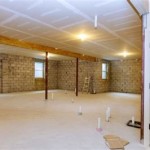Do Houses in Houston Have Basements? Unveiling the Underground Truth
The question of whether houses in Houston commonly feature basements is a frequent one for those relocating to the city or considering purchasing property there. The answer, however, is not a simple yes or no. While basements are a standard feature in many parts of the United States, particularly in regions with colder climates, they are relatively rare in Houston and other parts of the Texas Gulf Coast. Several factors contribute to this unusual situation, ranging from geological characteristics to economic considerations.
Understanding why basements are uncommon in Houston requires examining the interplay of these various influences. It is a combination of environmental realities, building practices, and economic decisions that have shaped the architectural landscape of the city, leading to a prevalence of slab-on-grade foundations rather than subterranean living spaces.
Geological Considerations: Houston's Soil and Water Table
One of the most significant reasons for the scarcity of basements in Houston stems from the region's specific geological makeup. Houston is situated on the Gulf Coastal Plain, characterized by predominantly clay-rich soil. This type of soil possesses several properties that make it less than ideal for basement construction. Clay soil tends to expand when wet and contract when dry, a process known as expansive soil behavior. This constant shifting can exert significant pressure on basement walls, potentially leading to cracks, leaks, and structural damage over time. The cost to mitigate this issue would be substantial and would ultimately raise the price of a building project.
Furthermore, Houston has a high water table. The water table refers to the upper surface of groundwater saturation in a given area. A high water table means that the groundwater level is relatively close to the surface of the ground. In Houston, this proximity of groundwater poses a significant challenge for basement construction. Excavating below the water table necessitates extensive and costly waterproofing measures to prevent water from seeping into the basement. Without such precautions, basements are highly susceptible to flooding and moisture problems, rendering them unusable and potentially damaging the structure of the house above.
The combination of expansive clay soil and a high water table creates a challenging environment for basement construction. The potential for structural damage from soil movement and the risk of water intrusion necessitates expensive engineering solutions and ongoing maintenance, making basements a less attractive and cost-effective option for many homeowners and builders.
Climate and Weather Patterns: Houston's Rainfall and Humidity
Houston's climate and weather patterns also play a role in the infrequent use of basements. The city experiences high levels of rainfall throughout the year, with the annual average exceeding 50 inches. This heavy rainfall contributes to the already high water table, further exacerbating the risk of basement flooding. Moreover, Houston is known for its high humidity levels, especially during the summer months. This humidity can create a damp and uncomfortable environment in basements, fostering mold growth and potentially affecting the air quality of the entire house. The additional cost of dehumidification equipment to manage the high levels of humidity would be an added expense for a homeowner.
While modern waterproofing techniques and drainage systems can mitigate some of these climate-related challenges, they add significantly to the overall construction cost. In a region where alternative foundation types, such as slab-on-grade, are more cost-effective and better suited to the climate, basements become a less practical choice for many builders and homeowners. The added expense of mitigating the negative effects of Houston’s climate and weather patterns makes basements a less popular option in the area's real estate market.
Economic and Construction Practices: Cost-Effectiveness and Foundation Alternatives
Beyond the geological and climatic factors, economic considerations and established construction practices also contribute to the infrequency of basements in Houston. Slab-on-grade foundations, where the concrete slab is poured directly onto the ground, are a common and cost-effective alternative in this region. This type of foundation is relatively simple to construct, requires less excavation, and is less susceptible to the problems associated with expansive soil and high water tables. The lower initial cost and reduced maintenance requirements make slab-on-grade foundations an attractive option for both builders and homeowners, particularly in a market where affordability is a key consideration.
Furthermore, the lack of a long-standing tradition of basement construction in Houston has influenced building practices and consumer preferences. In many parts of the country where basements are common, they are viewed as valuable living spaces that can add significant value to a home. However, in Houston, where basements are less common, they are not always seen as essential features. This lack of demand, in turn, reinforces the preference for more cost-effective foundation alternatives. Also, many homeowners purchase homes based on square footage above ground, so building an entire level beneath ground is not necessarily factored into the price of a home, or the desire to purchase one.
The economic advantages of slab-on-grade foundations, combined with the absence of a strong market demand for basements, has led to a building culture that favors alternative foundation types. This established construction practice further perpetuates the rarity of basements in Houston, making them a less common feature in the city's residential landscape.
While it is possible to construct basements in Houston using advanced engineering techniques and waterproofing systems, the added cost often outweighs the perceived benefits for many homeowners. The combination of geological challenges, climate-related considerations, and economic factors has created a situation where basements remain a relatively uncommon feature in Houston's residential architecture. The decision to build a basement is ultimately a matter of personal preference and budget, but the realities of Houston's environment and building practices make it a less prevalent option compared to other regions of the United States.
Homeowners considering adding a basement to their Houston property should carefully weigh the costs and benefits before proceeding. Consulting with experienced engineers and contractors who are familiar with the region's specific geological and climatic conditions is essential to ensure the project is feasible and sustainable in the long term. While basements may not be the norm in Houston, they can be successfully constructed with proper planning and execution.
Therefore, while not entirely absent, basements remain a relative rarity in Houston's housing market. The geological conditions, climatic factors, and economic considerations all contribute to a building environment that favors alternative foundation systems. The prevalence of slab-on-grade foundations provides a cost-effective and practical solution for many homeowners, making basements a less common feature in the city's residential landscape.
The relative scarcity of basements in Houston is a testament to the impact of environment and economics on architectural design. The city's unique combination of geological makeup, climate patterns, and building practices has shaped the residential landscape, leading to a prevalence of above-ground living spaces rather than subterranean ones.
Nevertheless, there might be niche markets or specific areas within Houston where basements are slightly more common, perhaps due to more favorable soil conditions or higher-end construction projects. However, these instances remain the exception rather than the rule. The vast majority of homes in Houston are built without basements, reflecting the prevailing trends and challenges associated with subterranean construction in this region.

Why Don T Homes Have Basements Twg Blog

Why Don T Homes Have Basements Twg Blog

Why Don T Homes Have Basements Twg Blog

Why Don T Homes Have Basements Twg Blog

Why Don T Houston Homes Have Basements 2024

Why Don T Houston Homes Have Basements 2024

Homes For Sale In Houston Tx With Basement Realtor Com

Homes For Sale In Houston Tx With Basement Realtor Com

Basement Houston Tx Real Estate 4 Homes For Sale Zillow

Why Many Homes Don T Have Basements 12 Tomatoes
Related Posts







